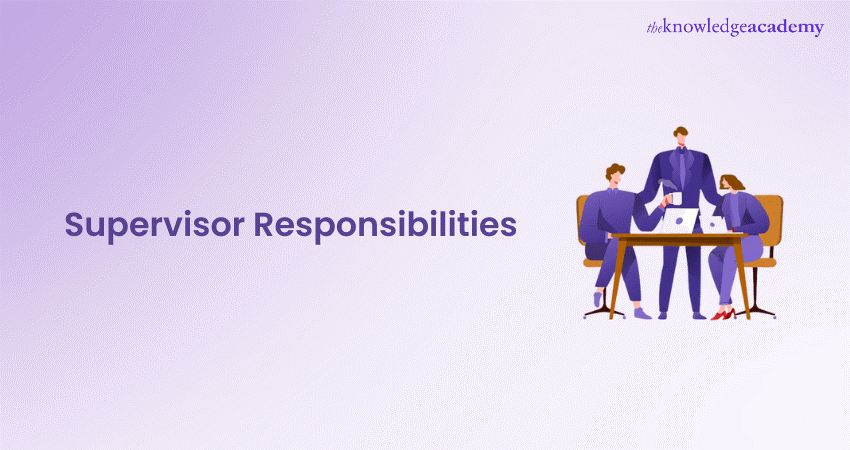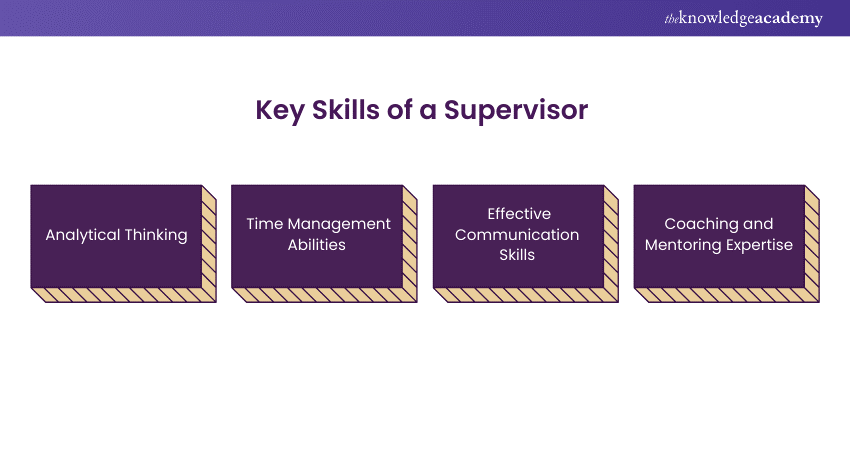We may not have the course you’re looking for. If you enquire or give us a call on +61 272026926 and speak to our training experts, we may still be able to help with your training requirements.
Training Outcomes Within Your Budget!
We ensure quality, budget-alignment, and timely delivery by our expert instructors.

Supervisors are entrusted with many responsibilities. They shoulder multifaceted responsibilities, essential for the smooth functioning of their teams and the organisation's overall success. These professionals oversee workflow, ensuring tasks are completed efficiently and quality standards upheld. Along with that they also train new employees, imparting necessary skills and knowledge. In this comprehensive guide, we delve into the multifaceted responsibilities of a supervisor, their objectives, key skills required, and strategies for excelling in the role.
Table of Contents
1) What are the responsibilities of a supervisor?
2) Objectives of supervision
3) Key skills of a supervisor
4) Conclusion
What are the responsibilities of a supervisor?
Managing team schedules, they balance workload distribution and adapt to changing business needs. Acting as a bridge between frontline staff and senior management, Supervisors report on performance metrics and advocate for their team's needs. Regularly assessing performance and offering constructive feedback, they foster employee growth and development, recognising and facilitating career opportunities. Additionally, Supervisors mediate conflicts, promoting a harmonious work environment conducive to productivity and collaboration. In essence, Supervisors play a pivotal role in orchestrating the dynamics of their teams, driving performance, and fostering organisational success through effective leadership and management.
1) Supervising workflow
Supervisors are responsible for overseeing the day-to-day operations within their department or team. This includes ensuring that tasks are completed efficiently, deadlines are met, and quality standards are upheld.
2) Training new employees
An important aspect of a supervisor's role is to hire and train new employees. This practice includes making them conversant with company policies, procedures, and job responsibilities. It also includes - providing ongoing support and guidance as they get used to their roles.
3) Developing and managing team schedules
Supervisors are assigned with creating and managing employee schedules. It is to ensure adequate and highest productivity. This calls for balancing workload distribution. It also takes care of employee availability and skillsets and adapting to changing business needs.
4) Reporting to HR and senior management
Supervisors serve as a bridge between upper management and other employees. They are responsible for conveying relevant information, such as team performance metrics, employee needs, and operational challenges, to the HR and senior leadership.
5) Assessing performance and offering feedback
One of the most critical responsibilities of a supervisor is to evaluate employee performance and provide constructive feedback. This helps employees understand their strengths and areas for improvement, fostering professional growth and development.
6) Recognising and facilitating career growth opportunities
Supervisors should actively identify and support career growth opportunities for their team members. Whether through additional training, mentorship programs, or internal promotions, fostering career advancement contributes to employee satisfaction and retention.
7) Assisting in resolving employee conflicts and issues
Conflict resolution is an inevitable aspect of any workplace. Supervisors are tasked with mediating disputes, addressing grievances, and promoting a harmonious work environment. Effective conflict resolution skills are essential for maintaining team cohesion and morale.
Develop the ability to supervise and inspire teams effectively with our Management Courses – register now!
Objectives of Supervision
The primary objective behind the position of a supervisor is to oversee the performance of employees and their productivity. The intention is to serve as an intermediary between the employees and senior management. It is to maintain clear communication between the two domains play a pivotal role. The objectives of supervision include:
1) Ensuring that organisational goals and objectives are met
2) Enhancing productivity and employee performance
3) Exercising professional growth and development
4) Promoting a positive work culture
5) Promoting employee engagement
6) Mitigating risks
7) Resolving inter and intra-team conflicts effectively
Key skills of a supervisor
The key skills of a supervisor incorporate a diverse set of abilities. These elements are crucial for effective leadership and management. Supervisors must possess qualities like coaching and mentoring expertise, analytical thinking, effective communication and time management. These skills guide and support their team members' professional development. If carried out efficiently it helps in recognizing individual strengths and providing constructive feedback. By mastering these key skills, supervisors can effectively lead their teams, drive performance, and create a positive work environment conducive to growth and success.

1) Analytical thinking
Supervisors need to possess strong analytical skills. It helps in assessing complex situations, identify underlying issues, and formulate effective solutions. This involves gathering and analysing data, evaluating outcomes, and making proper decisions that drive business success.
2) Time management abilities
Effective time management is essential for Supervisors to juggle multiple responsibilities and priorities efficiently. This includes prioritising tasks, delegating effectively, and allocating resources wisely to meet deadlines and goals.
3) Effective communication skills
Clear and concise communication is paramount for Supervisors to convey expectations. It also assists in providing feedback and facilitate collaboration within their team. Strong communication skills enable Supervisors to articulate ideas, resolve conflicts, and exercise a culture of transparency and openness.
4) Coaching and mentoring expertise
Supervisors serve as mentors and coaches to their team members. They provide guidance, support, and professional development opportunities. This requires the ability to recognise individual strengths and weaknesses. It provides constructive feedback and empower employees to reach their full potential.
Enhance your communication skills wth our Communication Skills Course – join now!
How to excel as a supervisor?
To excel at Supervisor Responsibilities, and one must adopt a proactive and holistic approach to leadership. It needs to be centred on supporting team growth and fostering a positive work environment. Taking ownership of the team involves leading by example, demonstrating accountability, and exercising a sense of unity and camaraderie. By embracing certain principles and actively cultivating a culture of support, accountability, and growth, Supervisors can excel in their role. These elements include:
1) Support employee career growth
Invest in your team's professional development. Provide them with opportunities for learning and growth. Encourage all employees to set proper career goals, offer mentorship and training programs. Also, advocate for advancement opportunities within the organisation.
2) Continuously support your team
Demonstrate unwavering support for your team members by advocating for their needs, defending their decisions, and recognising their achievements. Build trust and loyalty by standing behind your team, especially in challenging situations.
3) Take ownership of your Team
As a supervisor, it is important to take ownership of your team's successes and failures. Taking responsibility for actions, led by example, and demonstrate accountability in all aspects of the role. This implements a sense of unity within the team.
4) Ensure feedback is consistent
Provide regular and constructive feedback to your team members. This is to help them improve performance and achieve their goals. Encourage an environment where feedback is valued, both from supervisors and peers.
5) Foster a positive team environment
Promoting a positive and inclusive work culture is always a win-win idea. Here, team members feel valued, respected, and motivated to succeed. Encourage collaboration, celebrate diversity, and create opportunities for team bonding and camaraderie.
Conclusion
In conclusion, the role of a supervisor is multi-layered. it is a demanding role, requiring a diverse skill set and a proactive approach to leadership. By grasping their responsibilities, objectives, and key skills, Supervisors can effectively manage their teams. They can drive performance and contribute to organisational success. Creating a positive and productive work environment for their team members is of utmost importance. By embodying the principles of support, empowerment, and accountability, they can excel in their role.
Frequently Asked Questions

The five simple rules every supervisor should follow are:
1) Know the employees
2) Provide regular feedback
3) Do not ignore non-performance
4) Praise good work
5) Acknowledge work environment

The three Ps of Supervision are purpose, process and philosophy.

The Knowledge Academy takes global learning to new heights, offering over 30,000 online courses across 490+ locations in 220 countries. This expansive reach ensures accessibility and convenience for learners worldwide.
Alongside our diverse Online Course Catalogue, encompassing 17 major categories, we go the extra mile by providing a plethora of free educational Online Resources like News updates, Blogs, videos, webinars, and interview questions. Tailoring learning experiences further, professionals can maximise value with customisable Course Bundles of TKA.

The Knowledge Academy’s Knowledge Pass, a prepaid voucher, adds another layer of flexibility, allowing course bookings over a 12-month period. Join us on a journey where education knows no bounds.

The Knowledge Academy offers various Business Skills Courses, including Leadership Courses, Management Training, Communication Skills Courses, Train the Trainer Courses, and HR Courses. These courses cater to different skill levels, providing comprehensive insights into 9 Benefits of Managing People.
Our Business Skills Blogs cover a range of topics related to leadership approach, offering valuable resources, best practices, and industry insights. Whether you are a beginner or looking to advance your leadership skills, The Knowledge Academy's diverse courses and informative blogs have you covered.







 Top Rated Course
Top Rated Course




 If you wish to make any changes to your course, please
If you wish to make any changes to your course, please


